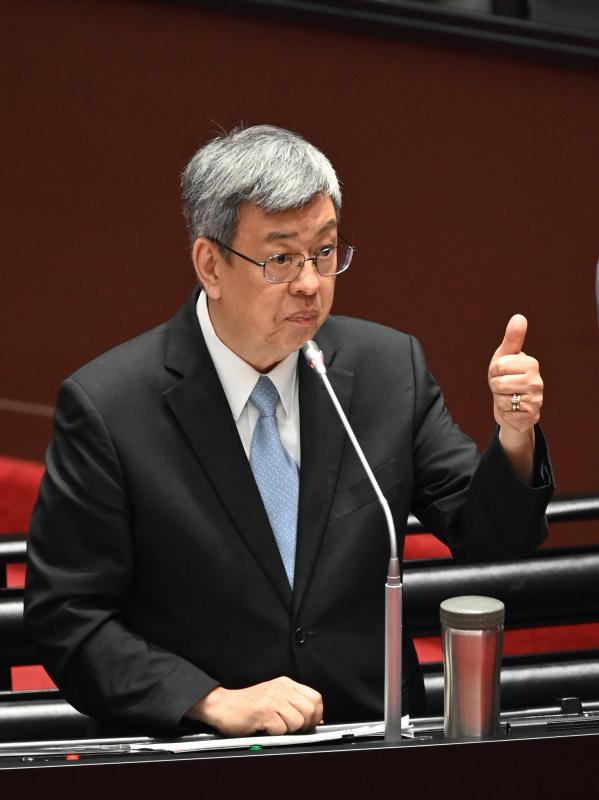The Indigenous Defense Submarine program is important to maintain Taiwan’s stability, so party caucuses should discuss funding proposals rationally and reasonably, Premier Chen Chien-jen (陳建仁) said yesterday amid reports that Chinese Nationalist Party (KMT) Legislator Ma Wen-chun (馬文君) has proposed 135 motions to cut or freeze national defense budget proposals, including for the program.
The legislature’s National Defense and Foreign Policy Committee is to review the national defense budget next week.
Legislative Yuan records show that Ma has made 121 proposals to freeze NT$1.29 billion (US$39.91 million) of defense spending and cut NT$180 million, alongside 14 other proposals to slash funds for classified projects.

Photo: Wang Yi-sung, Taipei Times.
Citing a lack of submarine testing experience, Ma proposed freezing NT$300 million of the program’s funding, with the money to be made available after program officials and the Ministry of National Defense brief the legislature on the details of testing procedures.
KMT Legislator Liao Wan-ju (廖婉汝) also proposed a NT$30 million budget freeze, citing delays in 2021 and last year of project implementation and questioning the ministry’s intent for allotting funding for a prototype submarine well into 2025.
The funding would be available once the ministry submits a report addressing her questions and the legislature finds it satisfactory, Liao said.
The ministry allotted NT$3.93 billion for the program next year to cover the costs of optimizing the prototype submarine.
The KMT caucus yesterday issued a notice in support of Ma.
The Democratic Progressive Party (DPP) has governed for seven years with a legislative majority, and it is not news that its legislators are only parroting the party stance instead of upholding the public’s interests, the statement said.
Ahead of planned defense budget reviews, the DPP has malignantly distorted Ma’s proposals in “an act of revenge,” when she exercised her constitutional duty of government oversight, it said.
Freezing funds is a tool employed by the eight standing legislative committees to ensure that the government observes fiscal responsibility, which is in line with the checks and balances nature inherent in a democratic system, the KMT said.
DPP lawmakers ignoring their duties of government oversight and slandering opposition legislators for doing their jobs should be condemned, it said.
Separately, the DPP caucus said that the KMT’s proposals were an abuse of legislative power.
DPP Legislator Hung Sun-han (洪申翰) said that while lawmakers are allowed to cut and freeze budgets, the power should not be abused for personal vengeance.
Ma’s actions could be construed as an open threat to the administrative arm of government, Hung said.
Meanwhile, Minister of National Defense Chiu Kuo-cheng (邱國正) declined to comment on the budget proposals, saying that legislators were doing their jobs.
Chen said that the submarine program is important to bolster the nation’s coastal frontier defense, maintain Taiwan’s stability and peace in the region, so hopefully the caucuses would discuss the issue rationally and supervise the government reasonably.
Additional reporting by Chen Cheng-yu and Yu Kai-hsiang

SECURITY: As China is ‘reshaping’ Hong Kong’s population, Taiwan must raise the eligibility threshold for applications from Hong Kongers, Chiu Chui-cheng said When Hong Kong and Macau citizens apply for residency in Taiwan, it would be under a new category that includes a “national security observation period,” Mainland Affairs Council (MAC) Minister Chiu Chui-cheng (邱垂正) said yesterday. President William Lai (賴清德) on March 13 announced 17 strategies to counter China’s aggression toward Taiwan, including incorporating national security considerations into the review process for residency applications from Hong Kong and Macau citizens. The situation in Hong Kong is constantly changing, Chiu said to media yesterday on the sidelines of the Taipei Technology Run hosted by the Taipei Neihu Technology Park Development Association. With

CARROT AND STICK: While unrelenting in its military threats, China attracted nearly 40,000 Taiwanese to over 400 business events last year Nearly 40,000 Taiwanese last year joined industry events in China, such as conferences and trade fairs, supported by the Chinese government, a study showed yesterday, as Beijing ramps up a charm offensive toward Taipei alongside military pressure. China has long taken a carrot-and-stick approach to Taiwan, threatening it with the prospect of military action while reaching out to those it believes are amenable to Beijing’s point of view. Taiwanese security officials are wary of what they see as Beijing’s influence campaigns to sway public opinion after Taipei and Beijing gradually resumed travel links halted by the COVID-19 pandemic, but the scale of

A US Marine Corps regiment equipped with Naval Strike Missiles (NSM) is set to participate in the upcoming Balikatan 25 exercise in the Luzon Strait, marking the system’s first-ever deployment in the Philippines. US and Philippine officials have separately confirmed that the Navy Marine Expeditionary Ship Interdiction System (NMESIS) — the mobile launch platform for the Naval Strike Missile — would take part in the joint exercise. The missiles are being deployed to “a strategic first island chain chokepoint” in the waters between Taiwan proper and the Philippines, US-based Naval News reported. “The Luzon Strait and Bashi Channel represent a critical access

Pope Francis is be laid to rest on Saturday after lying in state for three days in St Peter’s Basilica, where the faithful are expected to flock to pay their respects to history’s first Latin American pontiff. The cardinals met yesterday in the Vatican’s synod hall to chart the next steps before a conclave begins to choose Francis’ successor, as condolences poured in from around the world. According to current norms, the conclave must begin between May 5 and 10. The cardinals set the funeral for Saturday at 10am in St Peter’s Square, to be celebrated by the dean of the College